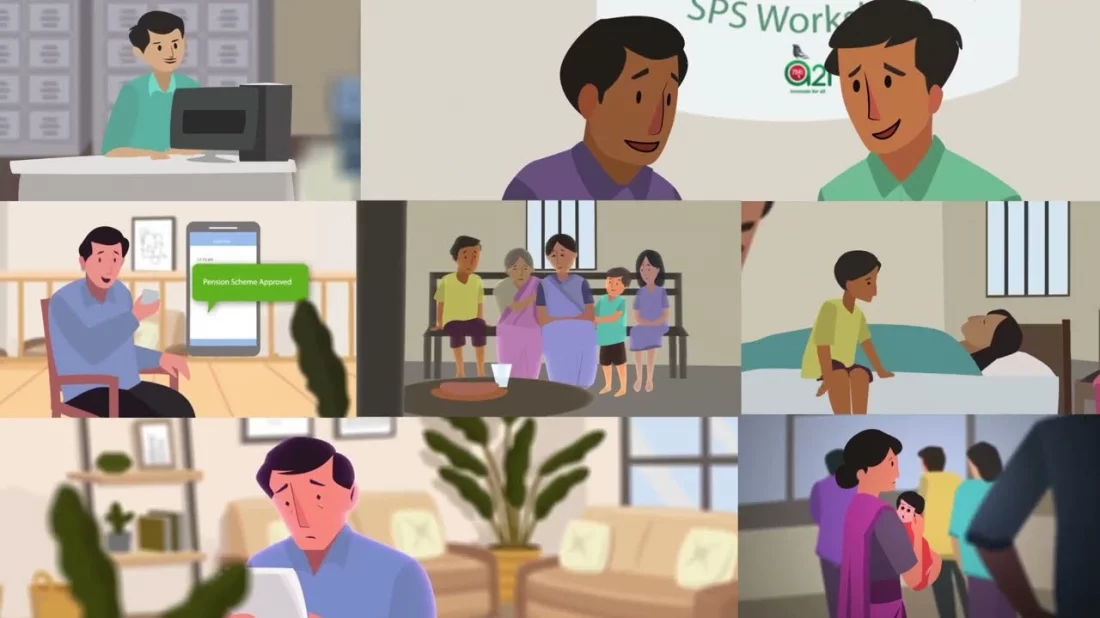12 July, 2023
Making money online
With the rising accessibility of the internet, online platform usage in Bangladesh has been increasing...
Date: 12 March, 2024
Reading Time: 6 Minutes

Despite having obstacles, the SPS process has greatly increased the satisfaction of service recipients, in line with the public’s expectations for quick, effective, transparent, and responsible public services in Bangladesh.
Service process simplification (SPS) serves as a tool for civil officials to help them accelerate access to public services, decreasing the time, cost, and number of visits (TCV) needed by citizens to use them. This in turn leads to improving service quality and ultimately, ensuring citizen satisfaction.
SPS is a unique innovation of the Aspire to Innovate (a2i) program. Its journey started in 2012 and till now, this innovation has simplified around 800 services belonging to different ministries and departments.
Understanding the need for SPS
SPS is required to gradually address the diverse needs of the citizens, ease the service, speed up the procedure, and provide services more affordably and efficiently. Together, these result in a major improvement of the service process.
There are some traits that constitute SPS. It assures service recipients of the greatest possible benefit, discards redundant service processes, and establishes connections and collaborations between various processes by involving interested officials at the outset of the simplification processes and strengthening their capacities to make decisions on the simplification procedures.
SPS creates a way of lowering the number of appointments and pointless paperwork needed to obtain services. This service has a dimension of analyzing laws, rules, policies, and procedures carefully and generating fresh concepts with a full execution plan. SPS also creates a new way of giving creative ideas priority over software resources and utilizing information technologies as an additional instrument in the process of providing services.
Public services that are complex in nature and time-consuming impede the government’s decision-making and policy execution procedures, progress, and the achievement of national
goals.
Where does Bangladesh stand globally regarding SPS?
Many people have been surprised by Bangladesh’s recent success, especially considering how the nation was formed — it emerged from a genocide and a war a little more than 50 years ago. The country’s shift from being an LDC to a developing country by 2026 is a significant milestone on its path to becoming a thriving economic force.
To continue advancing, SPS has and will have to play a significant role. Moreover, in order to sustain progress across various domains, it is essential that politicians, business proprietors, educators, bureaucrats, investors, and other development architects in Bangladesh acknowledge these growth objectives.
According to research conducted by the United Nations, Bangladesh is among the top least developed countries (LDCs) with the highest EGDI ranking, and it has maintained this position for two surveys in a row. Bangladesh is pursuing various e-government endeavours to enhance efficacy and capability in ensuring the delivery of public services. As per the UN E-Government Survey 2022 conducted by UNDESA, which evaluated the progress made in the past two years,
Bangladesh rose eight places to rank 111 out of 193 nations.
Besides, Bangladesh has also implemented noteworthy and ongoing business reforms for the advancement of its economy, including simplifying procedures, automating tasks like service delivery, and registering businesses. This shortened the time needed to finish tax and value-added tax registrations, as well as to get trading licenses. This development paved the way for enhanced business efficiency, consequently leading to greater economic benefits.
In Bangladesh, SPS has already been introduced to the public, and research conducted has already showed signs that the majority of the service recipients are satisfied with SPS and hold a positive attitude towards it. SPS has made it possible for the government to take corrective action to enhance public service delivery by prioritizing citizen-centred evaluations, which has helped to uncover loopholes and inefficiencies in service delivery.
People no longer have to rely on unnecessary paperwork, office visits, complex application processes, dependency on multiple offices, redundant service steps, etc.
SPS has thus directly or indirectly been responsible for:
There are also challenges for SPS, which include deficiencies in software, lack of universal access to the internet, lack of adequate manpower, lack of skilled technical persons, frequent transfer of public officials, lack of automation, need for redundant documents, lack of required budget, lack of proper equipment, and above all, biasness and corruption in service deliveries.
It is imperative for Bangladesh to address these issues for its status to move from the LDC to developing countries and in ensuring that this transition is smooth and seamless — as it loses many of the benefits afforded to LDCs.
Shaping the future
Every procedure and service has its drawbacks. Some suggestions for the betterment of SPS can include an increased public relations campaigns and accessibility-focused YouTube videos to let people know about the SPS service, enhancing the ability of officials and employees of different government service sectors, utilizing a2i’s digital centres for SPS services, increasing the number of ICT professionals employed in every governmental sector, updating software, transferring
practical staff members, and accelerating administrative processing times, among others.
Despite having obstacles, the SPS process has greatly increased the satisfaction of service recipients, in line with the public’s expectations for quick, effective, transparent, and responsible public services in Bangladesh. Together with everyone’s passion and effort, we can strive to ensure the success of Smart Bangladesh.

12 July, 2023
With the rising accessibility of the internet, online platform usage in Bangladesh has been increasing...

27 June, 2024
One of the key advantages of the ekPay is- it gets rid of the need...

27 March, 2023
a2i catalyses experimentation and public-private partnerships applying a gender lens to unlock new services and...